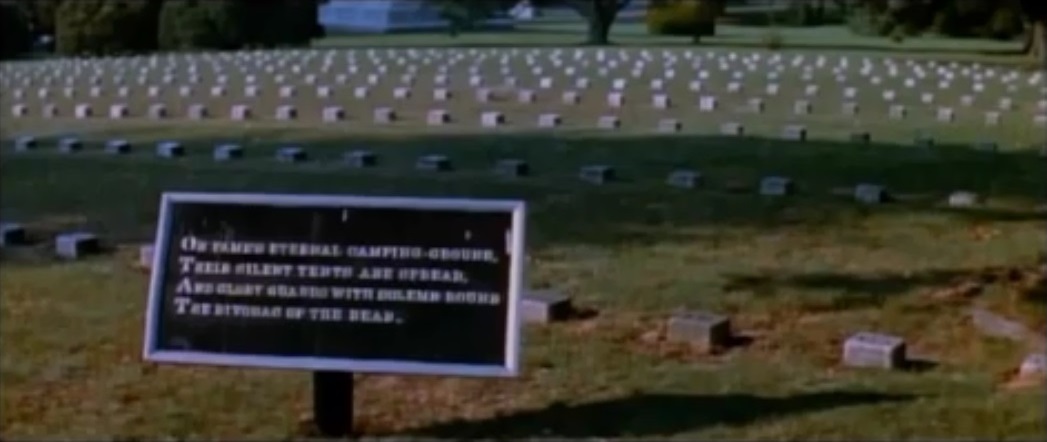Some
of the Best
Twenty-Five
Years of Motion Picture Leadership
M-G-M’s
Silver Anniversary, 1924-49.
Some of the
greatest films ever, and they know it.
The credit is
“compiled by” (“supervised by Frank Whitbeck”)
not directed, “under the leadership of Leo the Lion.” Lionel
Barrymore does the honors, with every star on the lot.
The
Battle Of Gettysburg

Dore Schary’s account,
filmed on location.
The CinemaScope
camera of George Folsey takes every vantage in the field,
marked out by statuary, attempts the climb of Little Round Top with furious
editing and slowly marches to a score arranged by Adolph Deutsch in Pickett’s
Charge.
Supplemental
paintings depict the carnage. Gettysburg Address a
postscript.
The
Invisible Boy
The very complex
allegory is primarily based on Dante, Milton and Valéry (My Faust). Nine
levels deep in the Stoneman Institute of Mathematics (its imposing gate stands
behind the opening credits) a giant-size computer bears “the sum total of
all human knowledge”, it aspires to be placed in orbit and rule the
world, to which end it kidnaps its creator’s son. The instrument of this
deed is Robby, the Robot.
Hoffman plays
this matter-of-factly to great advantage, up until Robby is mistaken by the
boy’s mother for a traveling salesman, and then he mounts the allegory in
his unblinking style all the way through to the end, The monstrous script is
chock-a-block with constant streams of material, which is the curious reason
why reviewers have consistently failed to notice The Invisible Boy. It
figures famously, however, as the framework of a Columbo, “Mind
Over Mayhem”.
The Nick Moses Story
The Untouchables
Frank Nitti keeps
the peace among Capone’s mob while the boss is away. A bit of squabbling
leads to a hit and Nitti’s verdict on the culprit, “you’re
dead!”
Ness is waiting
to hear from Washington on the new anti-racketeering law that will enlarge his
scope of operations. Nick Moses is counting on it to save his life. No-one can
touch Ness, the source would be obvious. If his enemies were to include
criminals of every stripe, anyone might be blamed. Nick offers to eliminate
Ness in exchange for a pardon from Nitti.
An assassin is
placed on a rooftop, Ness is called out from dinner at Newton’s to
receive a tip from a nervous hoodlum. Ness wheels him into the line of fire and
holds him up by his lapels for a shield as the shots fly.
Louie Lotito acts
as monitor for the time limit imposed by Nitti, Nick fails and is gunned down.
“Either way,” Nitti had said, “I win.”
The Squad
Combat!
Details abound to
prepare the portrait of a Georgia draftee, drawing on Sergeant York in
some respects, advisedly.
The squad is on
the march and rests to enjoy what Pvt. Braddock calls “a nice quiet
summer day in the country.” Casualties have been heavy, one unit
reporting a loss of 60%, ten replacements are available to the entire
battalion. King Company fills in.
Moseby Lovelace
has a pair of nice new boots, Sgt. Saunders offers as much as $50 for them,
later prevents him from taking them off to ford a small river, and calls him
“Stonewall Jackson” behind his back. It’s the Yankee army to
Lovelace, who wants to fight, not dig foxholes.
He bests a German
flanking maneuver and captures a machine-gun nest. “My draft board
expects it of me,” he says, after Lt. Hanley’s curt thanks. And he
does it barefoot.
A German patrol
finds his boots on the riverbank and lays a trap. He takes them all prisoner,
ordering the English-speaker among them to carry his boots. “You take
mighty good care of ‘em, or you’re gonna be the sorriest Kraut this
side o’ perdition.” This prize includes a minefield map.
Lt. Hanley
reports on the Germans’ one-mile retreat as preparatory to an attack,
witness twelve tanks spotted en route. Lovelace nearly spoiled this
night patrol (“it’s like a turkey shoot,” Saunders tells him,
“only you’re the turkey”) by shooting two motorcycle
couriers, heard to complain in German about French coffee.
Now it’s
cheers from the squad as he returns in triumph. “A Georgia boy is just as
good goin’ barefoot as he is kissin’ pretty girls.”
A Real Nice, Friendly
Little Town
Bonanza
A stray bullet
hits Little Joe “in the Ponderosa”. Hoss trails the fellow who
fired the shot to the locale of the title, a sort of sister city to Black Rock.
Two wild young
men are well-protected in the town, and at home on their mother’s ranch.
This is Louise Latham at her level-aiming grittiest, a stern woman with a sense
of humor for some things and a slight fantastical air owing to the wool pulled
just a bit over her.
She takes no
criticism and has no patience with earnest Hoss and his tale of a saddle-sore
brother, except insofar as the laughingstock it makes overweighs the somewhat
distant vexing quality of the whole palaver.
Light gradually
begins to dawn on her, however, while Little Joe recuperates prone and the boys
find Hoss making his presence known, very gradually.
This odd surprise
of a family makes for a bit of gratitude to Ben for a good upbringing.
Hoffman’s
fine, racy script is the basis of an airy, elevated form of slapstick as cool
as a cucumber floating down the Carson River.